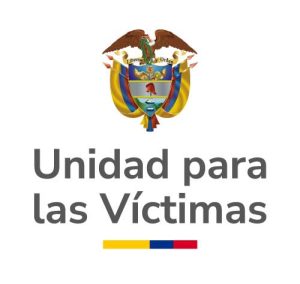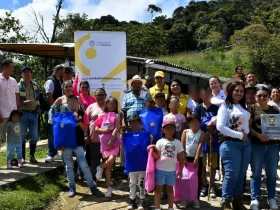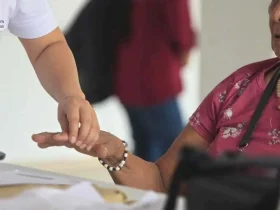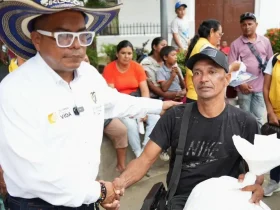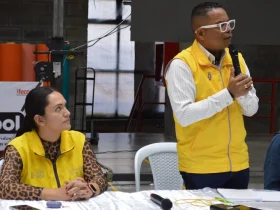“I was kidnapped on May 10th, 1988, by the FARC when I was working as a Council member in San Pablo (Bolivar), along with other ten government officials. We were in the Cañabraval village, visiting a construction-site that the current mayor was building. They judged us because they accused us of corruption. 30 days later they released us after we made them see we weren’t responsible for spending money.”
This is the first of several violent events related to the armed conflict that Nelida Ayala had to face; she is a community leader and one of the victims of the Sur de Bolivar region.
More than a decade later, in January 1999, terror was once again in her life when paramilitaries killed her brother, Jose Daniel Ayala, in a massacre committed in different parts of San Pablo’s urban area. That day, 14 people were killed. Her brother was accused of being a politician close to the FARC.
Nelida also remembers that, in September 2000, violence returned to her life and her family’s, when her son’s father, Edinson Ramos, was murdered in Bogota.
Two months later, paramilitaries operating in Barrancabermeja tried to recruit her 12-year-old son Steven, who was studying there. As a result, Nelida brought him back to San Pablo.
Thus, between accusations from different armed groups, during threats, harassment and extortion, this leader was forced to leave her home four times. Only when “the tide went out” did she return to her homeland.
Leadership in the blood
To honor the January 1999 massacre victims’ memory, where her brother Jose Daniel was murdered, Nelida created the organization Women Household Head Armed Conflict Victims in Rural and Urban Areas (Mudevisa in its Spanish acronym).
Initially, she made an open call on the local radio and managed to enroll 100 women. The association formally started in 2014, and today is well known in the Magdalena Medio region. Its 60 current members receive training from different entities for productive projects presentation and support. Currently, they are waiting to start a cachama fish business, as well as a laying hens’ business they pitch to Innpulsa, the government’s entrepreneurship and innovation agency attached to the Commerce Ministry. She says this ability to gather people and lead them is in her blood because his father, Jose Ayala Monroy, was a politician and community leader in the region.
She also believes her leadership skills are due to her time in the San Pablo Council, as well as her studies: she finished high school, did several technologic and specialization programs, and science and environment courses; she became interested in the victims and human rights subject and has completed several courses on the SENA.
Gathering partners and starting a business
Nelida is also part of Magdalena Medio’s Peasant Markets Association (Asomercam in its Spanish acronym), which promotes projects for rural producers and, once a month, organize farmers’ markets in San Pablo. “We place some tents here in the park with some shelves, where the peasants’ partners offer products for sale.”
With this logic and entrepreneurial spirit, Asomercam made a partnership with two other organizations, so that 166 conflict victims’ families promote brown rice sale production. They have the support of an organization called Participatory Public Health Construction Corporation (Obusinga in its Spanish acronym), which helps them with marketing and resources close to $500 million COP thanks to the Agriculture Ministry. Now they are waiting for a truck to transport rice from different farms, which will help them market it.
The 166 families are distributed in 11 San Pablo districts, as well as in 2 districts of the neighboring municipality called Cantagallo. “We already have the package legalized and permission from Invima. Now, each family sells retail in San Pablo, Cantagallo, or Barrancabermeja. However, we already visited organic stores in Bucaramanga. We also showed samples of the cereal and held a market to promote the product in Piedecuesta,” says Nelida with hope and pride.
But that isn’t Nelida’s only product on her farm. She has a few hectares of oil palm. With the earnings she managed to build her house in the urban area of San Pablo and, today, she is building two stores to market other products from her farm: cheese, eggs, corn, cachama, cattle and pork.
A long and caring life to live
Every time Nelida receives threats, or they try to extort money, she asks God to help her be rid of that and, she believes, she has managed to stay safe thanks her community’s recognition and social work among the region’s people. They constantly inform her about what is happening, where she should go and where not to. She also took a self-protection course with the Spanish embassy. She has tried to retire several times because she feels tired and give that leadership to others. “But people come to my house looking for me to help them, and then, as if one has that gift of service, I realize that is my calling; with every step towards that idea, I get more resistance to survive and continue forward.”
Nelida was also involved in representing women on the Territorial Approach Development Plans (PDET in its Spanish acronym). In the case of the PDET Sur de Bolívar (which includes seven municipalities in the area), she assures all the needs were discussed and two main lines were worked on: agriculture and public construction works. She considers this instrument has benefited this region, because several road plates have already been built that link paths, as well as the approval of a bridge construction on the road between the El Carmen de Cucu and Santo Domingo villages; furthermore, other projects regarding plantain crops and livestock are yet to come.
Likewise, this leader highlights the Unit for the Victims’ work through the family businesses units’ delivery, such as stores, beauty salons, ice cream parlors and bakeries, among others.
Forgiveness and reconciliation
Nelida tells how a few years ago, the paramilitary commander known as Julian Bolivar was in San Pablo in a pardon ceremony for her brother’s murder, where she forgave him. “That helped me a lot emotionally, because I used to cry a lot.”
As for her sentimental partner’s murder and his kidnapping, she says they told her the responsible were all dead and, in any rate, she has forgiven them.
For several periods, Nelida has been a member of the San Pablo Municipal Victims Board, as well as a member of the Human Rights Human Rights Defense Regional Corporation (Credhos in its Spanish acronym). She dreams of having a peaceful old age on her farm, continuing to work the soil for a living, help support her three grandchildren and, of course, she also dreams other people will hold her leadership, “so that when I step aside, they take the responsibility I have carried.”
(End/CMC/COG/RAM

